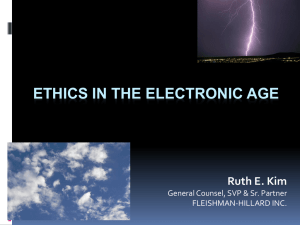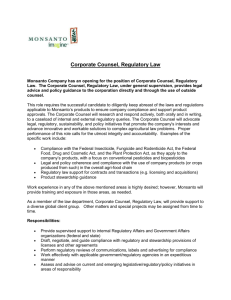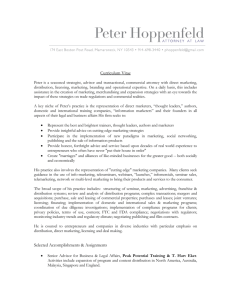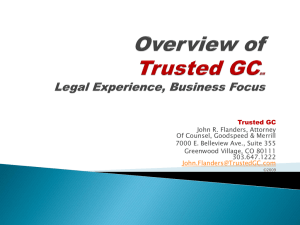Seeking Godly Counsel - JourneyOn Leadership
advertisement
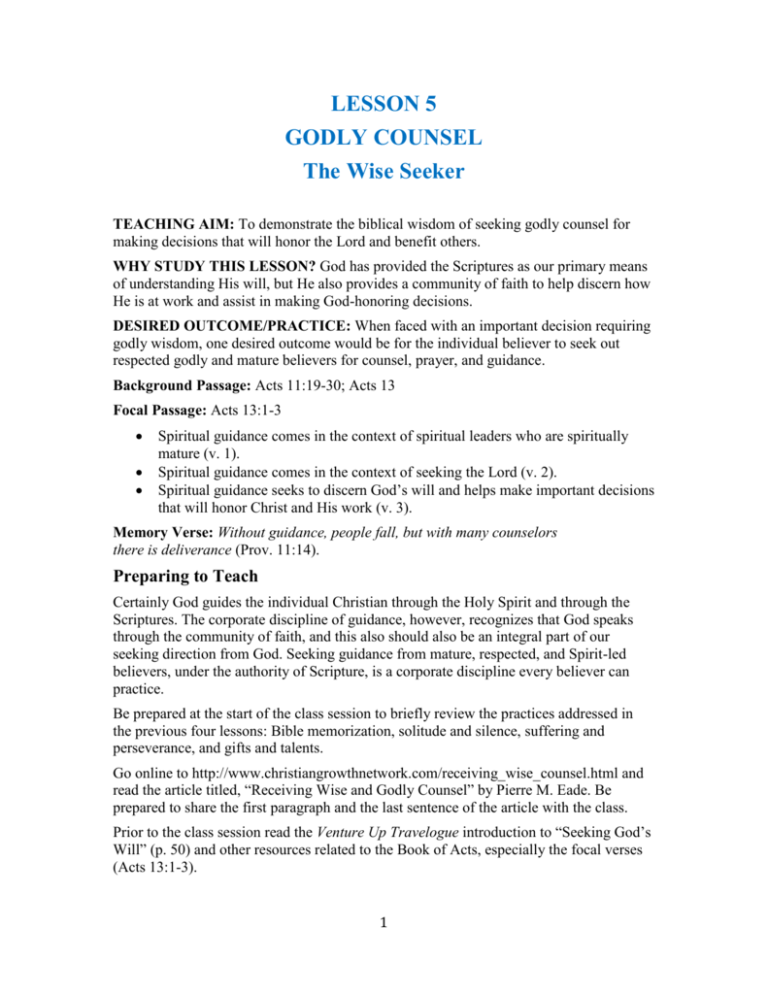
LESSON 5 GODLY COUNSEL The Wise Seeker TEACHING AIM: To demonstrate the biblical wisdom of seeking godly counsel for making decisions that will honor the Lord and benefit others. WHY STUDY THIS LESSON? God has provided the Scriptures as our primary means of understanding His will, but He also provides a community of faith to help discern how He is at work and assist in making God-honoring decisions. DESIRED OUTCOME/PRACTICE: When faced with an important decision requiring godly wisdom, one desired outcome would be for the individual believer to seek out respected godly and mature believers for counsel, prayer, and guidance. Background Passage: Acts 11:19-30; Acts 13 Focal Passage: Acts 13:1-3 Spiritual guidance comes in the context of spiritual leaders who are spiritually mature (v. 1). Spiritual guidance comes in the context of seeking the Lord (v. 2). Spiritual guidance seeks to discern God’s will and helps make important decisions that will honor Christ and His work (v. 3). Memory Verse: Without guidance, people fall, but with many counselors there is deliverance (Prov. 11:14). Preparing to Teach Certainly God guides the individual Christian through the Holy Spirit and through the Scriptures. The corporate discipline of guidance, however, recognizes that God speaks through the community of faith, and this also should also be an integral part of our seeking direction from God. Seeking guidance from mature, respected, and Spirit-led believers, under the authority of Scripture, is a corporate discipline every believer can practice. Be prepared at the start of the class session to briefly review the practices addressed in the previous four lessons: Bible memorization, solitude and silence, suffering and perseverance, and gifts and talents. Go online to http://www.christiangrowthnetwork.com/receiving_wise_counsel.html and read the article titled, “Receiving Wise and Godly Counsel” by Pierre M. Eade. Be prepared to share the first paragraph and the last sentence of the article with the class. Prior to the class session read the Venture Up Travelogue introduction to “Seeking God’s Will” (p. 50) and other resources related to the Book of Acts, especially the focal verses (Acts 13:1-3). 1 If you decide to use the Teaching Option in “Seeking God’s Will,” write the three questions on index cards to distribute to the three groups. In preparation for teaching the section “Seeking Godly Counsel,” familiarize yourself with the details of what is often called the Jerusalem Conference in Acts 15. Prepare a tear sheet with the following statement from the Travelogue, p. 56: Seeking godly counsel is not a sign of weakness but of strength and maturity. Be ready to distribute index cards and pencils for an activity in “Seeking Godly Counsel.” For the “Conclusion” of the lesson, enlist a class member to describe an occasion of being asked for godly counsel by someone else. Ask the member to include the sense of responsibility that came with the request, and the process used for determining what counsel to give. Teaching Suggestions SEEKING GUIDANCE Briefly review the practices from the previous first four lessons. Emphasize these disciplines are those believers essentially practice individually as part of their journey to becoming more like Christ. Today’s lesson topic, godly counsel, includes study of the Scriptures as the primary means of understanding God’s will. However, godly counsel also includes involving fellow believers to help discern how God is at work and to assist in making God-honoring decisions. Share the following quotes from Pierre Eade’s article, “Receiving Wise and Godly Counsel.” [Citing Proverbs 11:14, this lesson’s memory verse, Eade wrote], Last week at work I came across a challenging situation that I didn’t know how to handle. After some prayer and contemplation of my options I was still uncertain of the right path. I decided to write an e-mail to several Christian co-workers explaining my dilemma and asking their advice. The responses I received back were in one accord and confirming of the path I sensed the Lord wanted me to take. Eade further described the practice of seeking counsel from trustworthy believers as a sign of maturity and humility. However, he added, Ultimately, our trust should never be in the people who give the advice, but in God who through His Holy Spirit can use people to give us wisdom and assist us along the path of life.1 Say: This excerpt from Eade’s article is one example of seeking godly counsel in connection with a decision, problem, or crisis. Emphasize the importance of knowing those you contact for help well enough that you can have confidence their counsel will be godly. Use the two fill-in-the-blank statements about decision-making in the Travelogue, p. 49, as a basis for discussion. Call on volunteers to identify whether they usually make decisions on their own or with the guidance of others. After several respond, ask whether they feel more resistant or more receptive to the idea of seeking godly counsel and the reason for their choice. 2 SEEKING GOD’S WILL Using the introduction to “Seeking God’s Will” (Travelogue, p. 50) and other resources related to the Book of Acts, lecture briefly on the context of Paul’s three missionary journeys. Describe the city of Antioch and the church and their understanding that the gospel was for all people. Call on a learner to read aloud Acts 13:1 naming the prophets and teachers who made up the leadership team of the Antioch church. Call attention to the Travelogue, pp. 51-52, for background information about these men. Emphasize the importance placed on church leaders seeking the guidance of the Holy Spirit. Call attention to the three traits of these diverse leaders mentioned in the Travelogue: gifted in the Lord, mature in the faith, and influential in the body (p. 53). Ask: How well are these three traits practiced by leaders in our church? What is the value of seeking counsel from a diverse group of believers in discerning God’s will? Ask learners to read Acts 13:2-3 silently. Discuss the significance of Luke’s inclusion in verse two that the Antioch leaders were ministering and fasting when the Holy Spirit spoke to them. Point out that, while ministering usually refers to serving, it also is sometimes used to describe the act of worship. Call on a volunteer to describe the instruction the leaders received from the Holy Spirit. Point out that we don’t know whether the leaders were together or separate when they received the message from the Holy Spirit. Either would be possible. Refer back to the lesson’s opening illustration by Eade where the counsel received from coworkers was the same as he had understood to be God’s will. Emphasize that the Antioch church acted immediately with a type of commissioning service to send Paul and Barnabas out. Ask: How would you have felt being sent off on a mission without knowing details of what you were to do? Call on volunteers who have participated in mission trips to describe times when plans had to be changed and how they determined a change was needed. In light of Acts 13:1-3, discuss the responsibility of a church to an individual or team they send out. Ask: How effectively does our church support those who are called out? ________________________________________________________________________ Teaching Option Create three groups, giving each a question to discuss about seeking God’s will. (1) In what kinds of situations might it be most helpful to seek godly counsel? (2) What qualities are most important to you in a believer from whom you seek godly counsel? (3) When you seek godly counsel, how can you know the advice you receive is godly? Call on a representative from each group to state their question and report on their response. Discuss each group’s findings as needed. ________________________________________________________________________ Seeking Godly Counsel 3 Ask learners to turn to follow along in their Bibles as you overview Acts 15 regarding the conference held in Jerusalem to deal with the question of whether Gentiles could become Christians without being circumcised. State that this conference also serves as a model for seeking godly counsel. After debate and discussion in the Antioch church, Paul and Barnabas took the issue to Jerusalem for further discussion with the apostles and elders. Outline Peter’s role and the conclusion reached. Point out the “Stop, Look, and Listen” process outlined in the Travelogue, pp. 55-58. Display on a tear sheet the following statement from the Travelogue, p. 56, as a basis for discussion: Seeking godly counsel is not a sign of weakness but of strength and maturity. Point out the three benefits of seeking godly counsel (Travelogue, p. 56: (1) gaining a deep friendship with a godly person; (2) gaining greater insight into discerning God’s best; and (3) attaining wisdom to provide godly counsel for others. Discuss each point and call on volunteers for their insights. Distribute index cards and pencils. Ask learners to identify a decision that might lead them to seek godly counsel and list at least three persons they would seek out for such counsel. Based on the persons they listed, call on volunteers to identify qualities of these persons that made them trustworthy to provide godly counsel. Discuss as needed. Ask: Why is it preferable to seek godly counsel from several believers rather than one person? Note the relationship between the spiritual practice of solitude and silence and seeking godly counsel. Challenge learners to spend at least one day of their quiet time in the coming week reflecting on the names they identified for seeking godly counsel, asking God to show them whether these people have the character and Christ-likeness to provide wise counsel. Conclusion Call on volunteers to report on a time when they sought godly counsel and ways it was helpful in moving them toward understanding God’s will and becoming more like Christ. Call on a pre-enlisted learner to report on an occasion of being asked for godly counsel. He or she should describe the occasion, the sense of responsibility that came with the request, and the process used for determining what counsel to give. Emphasize the importance of believers who seek godly counsel also being willing to give it to children, grandchildren, relatives, friends, and other believers. Comment that mature believers may grow even more from taking seriously the responsibility of giving godly counsel. Pray Call on three volunteers to pray for the following: (1) wisdom to know who to seek for godly counsel; (2) discernment to evaluate counsel from others and to understand God’s will for themselves; and (3) willingness to offer godly counsel to others. Close the prayer time by asking God to guide each learner in the ability to discern God’s leadership for their lives. 4 Follow Through Midway through the week, send a follow-up email to your group with some or all of the following: 1 Remind learners to spend one of their quiet times during the week reflecting on the three people they might contact for godly counsel. Urge those who have not yet done this to do so before the next class session. Request that they reply to your email with insights they gained from praying and listening to God. Compile the replies and report during the next class. List the prayer requests from your last session, give any updates, and ask for continued prayer for these. Urge learners to study and respond to questions in the Travelogue for the next study on missions. http://www.christiangrowthnetwork.com/receiving_wise_counsel.html. 5
